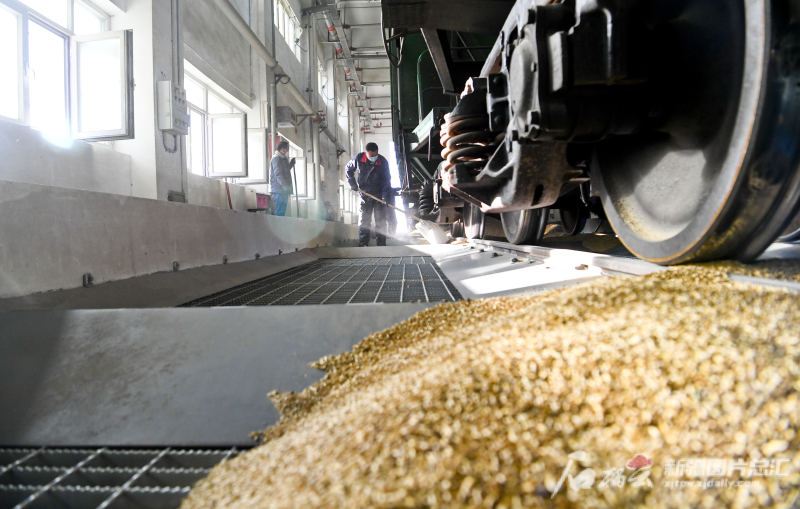Shiliuyun-Xinjiang Daily (Reporter Chen Qiangwei) news: On November 4, 2023, “See Xinjiang’s Development in its Ports” media report team arrived in Alashankou City of Bortala Mongolian Autonomous Prefecture in northwest China's Xinjiang Uygur Autonomous Region. In Alataw Pass comprehensive bonded area, reporters were swaying in the roaring wind together with trees on both sides of the road, and truly felt the speciality in Alashankou City.
Accompanied by the wind, Alataw Pass comprehensive bonded area receives trains from Kazakhstan loaded with wheat.

Photo shows workers in the modern grain logistics center unload grains in Alataw Pass comprehensive bonded area, northwest China’s Xinjiang Uygur Autonomous Region (Photo by Shiliuyun-Xinjiang Daily/ Tang Yong)
Seeing from the special line of broad-gauge for unloading bulk grain in the modern grain logistics center of Alataw Pass comprehensive bonded area, we captured the moment when golden wheat fell from the bottom of the funnel after workers opened the valve of the bulk grain carriage. The wheat was immediately transported to the grain silo.
“This year, this special line has handled trains carrying more than 300,000 tons of wheat from Kazakhstan,” said Zhang Faqi, deputy general manager of Alashankou Horizon Oil & Gas Co., Ltd., and one of the leaders of Alashankou modern grain logistics center project.
During the interview, his phone kept ringing. “These are all phone calls from companies interested in importing grain, and they are calling to consult the platform's services,” said Zhang Faqi, who now receives many entrepreneurs who come to visit and seek cooperation every day.
The first phase of Alashankou modern grain logistics center project, which started in 2020, has been completed and put into operation, and the second phase has passed the completion acceptance at the end of October this year. The total investment for the first phase and the second phase of the project is 450 million yuan (about 61.77 million U.S. dollars), to build a 1.363 km long broad gauge, five turnover warehouses and silos with the volume of 200,000 tons.
By showing us a construction team that was working, Zhang Faqi told us that they have been accelerating the construction of the third phase of the project. In the third phase, a standard-gauge railway for bulk grain loading and grain silos that can storage 100,000 tons of grain will be built, and the storage capacity of the project will be further improved.
Since the beginning of this year, as a designated port for grain import Alashankou has focused on the grain reserve and processing industry, and attracted a number of leading enterprises to settle down. As a result, related industrial projects have been completed and put into operation, and a complete industrial chain has been formed.
The project, making use of the original railway reloading line, mainly aims to transform and expand the railway loading and unloading trestle, tank farm, automobile loading and unloading facilities and pipelines. Realizing the loading and unloading capacity of 400,000 tons of liquefied petroleum gas and 450,000 tons of vegetable oil per year and the storage capacity of 6,000 cubic meters of liquefied petroleum gas and 30,000 cubic meters of vegetable oil.
“After the official operation of that project, vegetable oil can be transported directly from Kazakhstan to Alataw Pass comprehensive bonded area by train,” said Chen Yanpeng, head of the engineering department of Jingang Development Co., Ltd. in Alataw Pass comprehensive bonded area. The vegetable oil storage tanks can provide vegetable oil storage services for grain and oil processing enterprises. Moreover, vegetable oil can be transported to other provinces and regions in China through standard gauges, which further brings convenience to grain and oil processing enterprises.
With this project, Alataw pass will become the second port in China and the first port in northwest China that handles rail trains shipping imported liquefied petroleum gas.
Yang Haiquan, general manager of Alashankou Jinmu Biotechnology Co., Ltd., showed his interest in this vegetable oil reloading line. He said, “With this line, we can directly import crude oil from Kazakhstan and refine them, which enriches the varieties of our raw materials for production.
As an edible oil producing enterprise in Alataw Pass comprehensive bonded area, the second phase of the company’s project is in trial production, which will increase the annual production capacity of the enterprise in refined oil by 60,000 tons.
This year, we have produced 120,000 tons of edible oil, 40 percent of which is sold to other provinces and regions of China,” said Yang Haiquan.
Tang Bo, deputy director of the management committee of Alataw Pass comprehensive bonded area, said that Alataw Pass has made full use of its geographical advantage, resources and opportunities brought by national policies, enhanced and expanded trade through improving customs clearance service, managing to attract processing enterprises to settle down. With booming import and export processing industry, foreign trade will be further upgraded. Alataw Pass comprehensive bonded area strives to build five industrial clusters. Nowadays, clusters of deep and fine processing of imported agricultural products in Alataw Pass have begun to take shape. As of now, the import of bulk grains has increased by 155 percent year-on-year, and the import of oil crops has reached 160,000 tons, with a year-on-year increase of 31 percent.
At present, there are 14 enterprises that focus on imported grain processing in Alashankou City, forming a complete industrial chain. With more than 2 million tons of the designed production capacity of grain and oil processing and transformation, imported grain processing has become one of the important industries in Bortala Mongolian Autonomous Prefecture in northwest China's Xinjiang Uygur Autonomous Region.
(A written permission shall be obtained for reprinting, excerpting, copying and mirroring of the contents published on this website. Unauthorized aforementioned act shall be deemed an infringement, of which the actor shall be held accountable under the law.)









